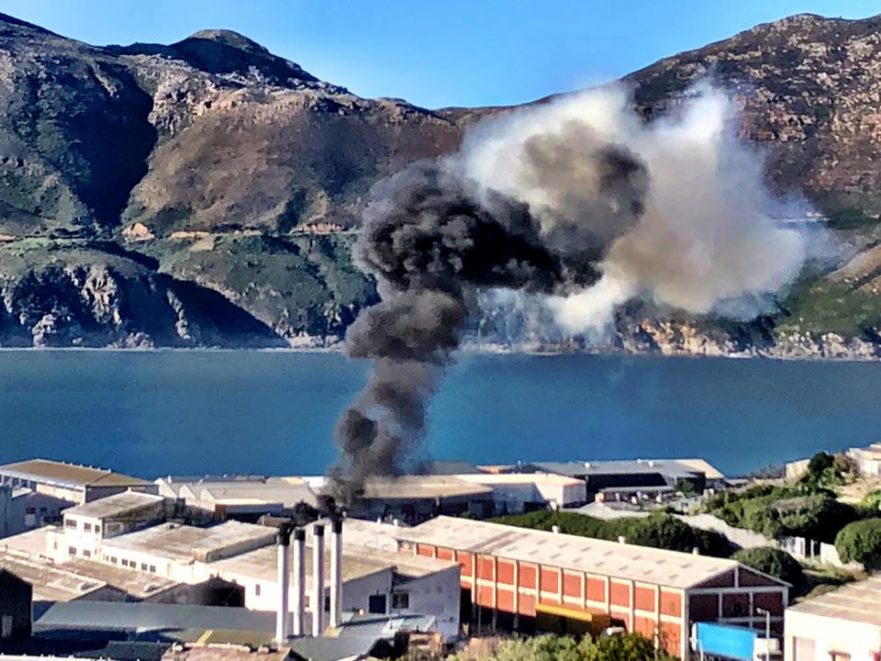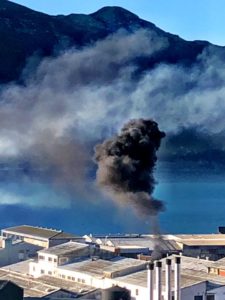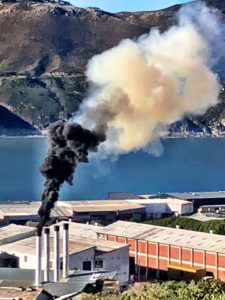City of Cape Town Denies FAHB Appeal
Over the past few months, we have been waiting to hear from the City of Cape Town regarding the appeal FAHB submitted to the decision to renew Oceana’s Atmospheric Emissions Licence (AEL) in January 2018. After over 3 months of waiting, the City finally made its verdict on 4 June 2018: they have denied our appeal, demonstrating they have no real interest in rectifying the on-going pollution from Oceana’s fishmeal factory in Hout Bay.
What did the FAHB appeal say?
The FAHB appeal was focused on two core issues:
- The public participation process conducted was not appropriate and lacked procedural fairness, as noted by an incompetent environmental assessment practitioner (EAP) who:
- Did not respond to nor engage with interested and affected parties (IAPs) during the public participation process.
- Did not respond to or provide information requested by IAPs, nor provided a functioning website to access information.
- Did not apply its mind to the objections received by IAPs and simply compiled these into a list that was summarily ignored.
- The City failed to consider the objections received through the public participation process before coming to a decision:
- The City did not ensure the objections raised by the IAPs were engaged with meaningfully.
- The City ignored the false information presented by the EAP and has continued to deny FAHB requests for further information regarding the health impact of the emissions.
- The City has summarily ignored the hundreds of complaints and impacts submitted by FAHB and instead continue to provide generic and repetitive responses to objections.
In summary, we argued that the City’s decision to renew the AEL was irrational:
- The decision was not rationally connected to the information before it, including the numerous objections submitted;
- The City failed to substantively consider, and therefore apply its mind, to relevant information and the objections raised; and
- The City failed to give reasons for not considering certain factors in the National Environmental Management Air Quality Act (NEMAQA).
The appeal was submitted to the City at the end of February 2018.
Why did the City deny the appeal?
The communication received from the City has the same characteristics we have become familiar with:
- Avoiding the key issues raised
- Providing the same generic responses
- Referring to other documents with the same generic responses
- Lacking any substance or relevant information
- Poorly put together with pages not even in the right order
From the communication we have received, both now and in the past, it is strikingly clear that the City has either no interest or no competence in addressing this issue. Instead of proactively trying to find a solution to the significant problem of air emissions in Hout Bay and its subsequent negative impacts, they continue to skirt around the issue, pretending it doesn’t exist.
The document notes the following specifics:
- The City complied with the law in terms of notifying the community about the public participation process through newspaper advertisements. They make no comment about the incompetency of the EAP, including the lack of engagement and access to information during the process.
- The City simply ignores the claim that they did not consider the objections raised and instead refer to a document that also ignores this concern.
- The City ignores the fact that inadequate responses were given to concerns raised. They say the responses were provided by Oceana and make no mention of the substance of complaints or responses, or the inaccuracies found in those responses.
- The City did not provide any indication of how objections had been considered, and only state that they had been.
- The City claims they are not obliged to give responses to the objections, they only need to give reasons for their decision.
- Regarding socio-economics, the City comments ‘it is clear that the City weighed up relevant interests and effects’ yet they provide no indication of how they determined socio-economic impact. They do not refer to any information, documents, or reports, and they summarily ignore the research submitted by FAHB regarding socio-economic impacts, as they did in their previous report.
In it’s final remark the City states that the ‘public commentary was an integral part of the decision making process’, a mocking attempt to assure us that our voices have been heard despite all the evidence speaking against this.
Do you feel that your comments were addressed? Do you think you were an ‘integral’ part of this process, that the City really considered your concerns and came to a conclusive decision for the betterment of the people of Hout Bay?
We certainly don’t.
The Day After
As the City continues to ignore this issue entirely, it should come as no surprise that the very next day after the decision to deny our appeal was made, this was the situation in Hout Bay with the Oceana fishmeal factory in full production:
When the City was informed of this, their response was ‘these images represent unacceptable operating conditions.’
It seems strange that on the one hand the City can issue a licence to Oceana knowing full well of its pollutant nature, and deny an appeal against that licence despite all of the concerns raised about the impact of that pollution. And then on the other hand, they appear alarmed that such pollution is taking place and suddenly deem it unacceptable.
Does the City not know that this is a regular occurrence in Hout Bay? After all the evidence presented to them, the concerns raised and the impacts experienced, the photographs, the emails, how can the City chose to remain so ignorant about the extent of this problem?
Or do they simply not care? Do they hope that if they continue to ignore our concerns, to avoid our questions, and to insult our intelligence, the problem will magically go away?
It’s hard to say.
The only thing we can say with absolute certainty is that the City has not demonstrated any interest or competence in addressing this important issue in Hout Bay.
What could the City have done differently?
As explained in our last FAHB update, shutting down the factory immediately is not an option due to the significant socio-economic impact this would have. Instead, we need to find a long-term solution to this problem, one that benefits everyone in the community.
In our appeal, FAHB proposed that Oceana’s AEL be suspended, and the licence renewal application restarted with an adequate and fair public participation process. We firmly believe that if a thorough, genuine public participation process was conducted, accompanied with socio-economic studies, we will begin to understand the true impact of Oceana’s emissions and start to find a solution for how this can be resolved.
The City claims they are exploring opportunities for economic development in the harbour, yet thus far there has been no indication that this is in motion. They have not initiated any studies, they have not called any meetings, they have not produced any reports. Instead, they have simply denied our appeal, continue to avoid our questions and concerns, and continue to act as if this situation is normal and acceptable.
Mossel Bay Fishmeal Factory Told to Shut Down
Interestingly, while the City of Cape Town continues to avoid the situation in Hout Bay, the Eden District Municipality (EDM) has chosen to ‘uphold the Constitutional right of the community to clean air’ when it refused to renew the AEL for Southern Cape Fish Meal in Mossdustria, near Mossel Bay.
While we are trying to obtain more information, we understand the EDM made this decision after conducting a comprehensive public participation process following a renewal application from the fishmeal factory. They concluded that the factory had not taken reasonable steps to prevent odour emissions, ‘as evidenced by the amount and degree of on-going complaints received.’
In addition, the Municipality did not support the renewal of the AEL because of the ‘negative impact on investment and economic growth’ in Mondustria and the greater Mossel Bay area.
It is hard to understand how such radically different decisions can be made in different municipalities. While air quality experts in EDM recognise the air emissions from fishmeal production to be unacceptable and understand the negative implications these emissions have on investment and economic growth, the City of Cape Town refuses to acknowledge either.
How can this be the case? We wrote to the City asking for answers and, as always, we are still waiting for an answer.
FAHB is currently seeking legal advice on the best way to proceed but the continued inaction and dismissal of the issue by the City makes any progress difficult. We need to hold our government representatives accountable – at the moment it is clear they are not serving the interests of their constituency in Hout Bay and have demonstrated no intention to do so in the near future.
***
If you have any questions regarding this update or information or ideas you would like to share, please feel free to get in touch.




Comments 6
Where is our Councillor? Does he not reside in Hout Bay? Is he not looking out for all Hout Bay Residents’ interests be it health issues , business interests. When original owner sold out earlier this year who bought his shares or the business?
Author
It’s important to understand that this decision came from the institution of the City of Cape Town, the department that regulates various industrial activities. This is somewhat separate from the role of the Councillor. We had a meeting several months ago with the Councillor and he understands it’s a problem, but that is is also a complex issue to solve. He said they are exploring opportunities for economic development in the harbour and we provided some information about this in our last update here: http://smellsfishy.co.za/fahb-update-march-2018/. I’m not sure about the transition of ownership within Oceana but I don’t believe this has affected the situation significantly – it’s a long-standing problem. In terms of the next steps, we are currently seeking legal advice and are strongly advocating that residents keep registering their concerns with the City, supplying honest, relevant information about how the emissions impact you. We will provide further updates on the way forward soon. Many thanks for your contributions!
This shows total lack of concern for the residents of Hout Bay , despite all the years of documented proof that this awful pollution is affecting the health and/or income from businesses , and we must continue to object until the problem is solved.
What is the next move? Surely we cannot simply accept this nonsensical response?
Author
You’re right Mike, we can’t accept this. We are currently seeking legal advice on how to proceed and are strongly advocating that residents keep registering their concerns with the City, supplying honest, relevant information about how the emissions impact you. One of the most important things to do is document the impacts, so we need help in this regard. We will provide further updates on the way forward soon. Thanks for your support!